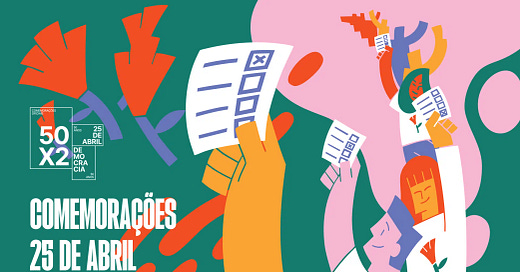Official celebrations for 51st anniversary of the Carnation Revolution unveiled
This year marks five decades since the first free and universal elections as well as the independence of former colonies, including Mozambique, Cape Verde, São Tomé and Príncipe, and Angola.
The official program for the 51th anniversary celebrations of the Carnation Revolution, on April 25, 2025, will highlight Portugal’s first free elections, the controversial events of November 25, and a public survey on the legacy of decolonization.
The commemorative commission, led by historian Maria Inácia Rezola, presented an extensive schedule of exhibitions, awareness campaigns, educational projects, academic colloquia, and cultural performances at the Lisbon Superior School of Music.
The full programme is available on the official website (here).
Foreseen in the MFA Program – which called for the “convocation, within twelve months, of a National Constitutional Assembly, elected by universal, direct, and secret suffrage, in accordance with an Electoral Law to be drafted by the future Provisional Government” – the elections for the Constitutional Assembly were the most contested and widely participated elections in our history.
This commemoration will serve as the theme for a debate on the future of Portuguese democracy.
Coinciding with the 50th anniversary of the most intense phase of the 1974-1975 Revolution, this will also be an opportunity to promote a debate on the history and memory of that period, recalling, in particular, the events of March 11 and November 25.
The anniversaries of the independence of Mozambique (June 25, 1975), Cape Verde (July 5, 1975), São Tomé and Príncipe (July 12, 1975), and Angola (November 11, 1975) will also be marked, as well as the unilateral declaration of independence of East Timor (November 28, 1975), along with other key moments in the construction of democratic Portugal, such as the approval of the new Press Law (February 26, 1975).
First free and universal elections
Rezola emphasized the significance of the first free and universal elections held on April 25, 1975.
These elections, which saw a record turnout of 92%, resulted in the formation of the Constituent Assembly responsible for drafting Portugal’s democratic constitution.
The historic process will be documented in the exhibition “Haverá Eleições: 50 Anos das Eleições para a Assembleia Constituinte” (There will be elections: 50 Years from the elections to the Constitutional Assembly) at the Calouste Gulbenkian Foundation from April to October.
The program will also address the revolutionary period’s most intense phase, including the failed coup by General António de Spínola on March 11, the turbulent “Hot Summer,” and the military confrontation on November 25, 1975.
A dedicated colloquium will bring together scholars and key figures to discuss this pivotal moment, which resulted in the victory of the moderate faction within the Armed Forces Movement (MFA).
Rezola welcomed open discussions on the topic, emphasizing the importance of historical debate in a democratic society.
Understanding Decolonization
The commission will also examine Portugal’s decolonization process through a public survey designed to assess current perceptions of the period.
Rezola acknowledged the emotional weight of the subject, noting that previous surveys primarily focused on the 1974 revolution itself, rather than the colonial war and subsequent independence of former colonies.
A key initiative of this year’s program is the #TensPoder campaign, aimed at engaging younger generations with the legacy of the first free elections and decolonization.
Featuring a soundtrack composed by young musicians mentored by singer Carolina Deslandes, the campaign highlights the power of democracy and civic participation.
Additionally, 25 Portuguese cities will host participatory youth assemblies, inviting young people to propose local improvement projects.
Since the launch of the commemorative program in 2022, over 300 initiatives have taken place, including artistic and academic funding programs totaling €3.3 million.
The commission has received more than 940 proposals for various projects.
The 50th anniversary celebrations will continue until 2026, marking five decades since Portugal’s first democratic legislative elections.




